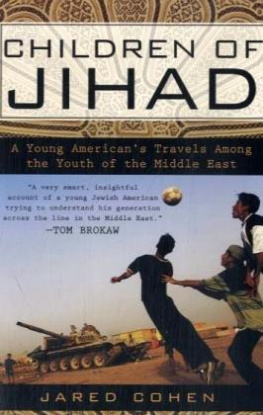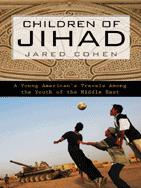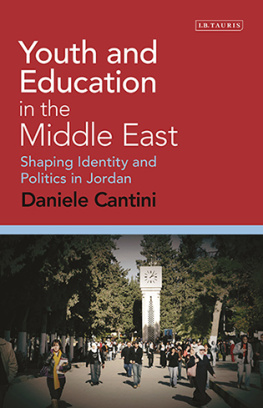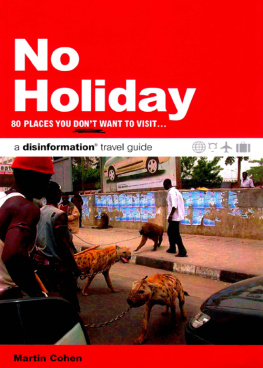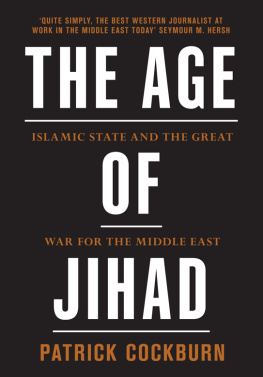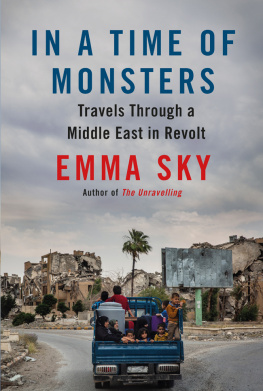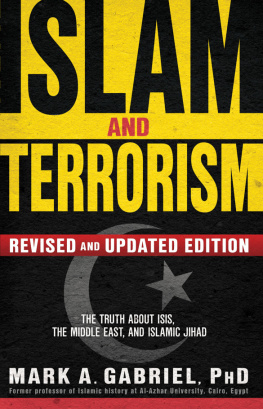Jared Cohen - Children of Jihad: A Young Americans Travels Among the Youth of the Middle East
Here you can read online Jared Cohen - Children of Jihad: A Young Americans Travels Among the Youth of the Middle East full text of the book (entire story) in english for free. Download pdf and epub, get meaning, cover and reviews about this ebook. year: 2008, publisher: Penguin Group USA, genre: Art. Description of the work, (preface) as well as reviews are available. Best literature library LitArk.com created for fans of good reading and offers a wide selection of genres:
Romance novel
Science fiction
Adventure
Detective
Science
History
Home and family
Prose
Art
Politics
Computer
Non-fiction
Religion
Business
Children
Humor
Choose a favorite category and find really read worthwhile books. Enjoy immersion in the world of imagination, feel the emotions of the characters or learn something new for yourself, make an fascinating discovery.
- Book:Children of Jihad: A Young Americans Travels Among the Youth of the Middle East
- Author:
- Publisher:Penguin Group USA
- Genre:
- Year:2008
- Rating:3 / 5
- Favourites:Add to favourites
- Your mark:
- 60
- 1
- 2
- 3
- 4
- 5
Children of Jihad: A Young Americans Travels Among the Youth of the Middle East: summary, description and annotation
We offer to read an annotation, description, summary or preface (depends on what the author of the book "Children of Jihad: A Young Americans Travels Among the Youth of the Middle East" wrote himself). If you haven't found the necessary information about the book — write in the comments, we will try to find it.
Children of Jihad: A Young Americans Travels Among the Youth of the Middle East — read online for free the complete book (whole text) full work
Below is the text of the book, divided by pages. System saving the place of the last page read, allows you to conveniently read the book "Children of Jihad: A Young Americans Travels Among the Youth of the Middle East" online for free, without having to search again every time where you left off. Put a bookmark, and you can go to the page where you finished reading at any time.
Font size:
Interval:
Bookmark:
ONE HUNDRED DAYS OF SILENCE: AMERICA
AND THE RWANDA GENOCIDE
A Young Americans Travels Among
the Youth of the Middle East

Though the author works for the U.S. Department of State, the views expressed in this book do not necessarily reflect those of the Department of State or the U.S. government.
GOTHAM BOOKS
Published by Penguin Group (USA) Inc.
375 Hudson Street, New York, New York 10014, U.S.A.
Penguin Group (Canada), 90 Eglinton Avenue East, Suite 700, Toronto, Ontario M4P 2Y3, Canada (a division of Pearson Penguin Canada Inc.); Penguin Books Ltd, 80 Strand, London WC2R 0RL, England; Penguin Ireland, 25 St Stephens Green, Dublin 2, Ireland (a division of Penguin Books Ltd); Penguin Group (Australia), 250 Camberwell Road, Camberwell, Victoria 3124, Australia (a division of Pearson Australia Group Pty Ltd); Penguin Books India Pvt Ltd, 11 Community Centre, Panchsheel Park, New Delhi110 017, India; Penguin Group (NZ), 67 Apollo Drive, Rosedale, North Shore 0632, New Zealand (a division of Pearson New Zealand Ltd); Penguin Books (South Africa) (Pty) Ltd, 24 Sturdee
Avenue, Rosebank, Johannesburg 2196, South Africa
Penguin Books Ltd, Registered Offices: 80 Strand, London WC2R 0RL, England
Published by Gotham Books, a member of Penguin Group (USA) Inc.
Copyright 2007 by Jared Cohen
All photos courtesy of the author
All rights reserved
Gotham Books and the skyscraper logo are trademarks of Penguin Group (USA) Inc.
LIBRARY OF CONGRESS CATALOGING-IN-PUBLICATION DATA HAS BEEN APPLIED FOR .
ISBN: 1-4295-6590-X
Without limiting the rights under copyright reserved above, no part of this publication may be reproduced, stored in or introduced into a retrieval system, or transmitted, in any form, or by any means (electronic, mechanical, photocopying, recording, or otherwise), without the prior written permission of both the copyright owner and the above publisher of this book.
The scanning, uploading, and distribution of this book via the Internet or via any other means without the permission of the publisher is illegal and punishable by law. Please purchase only authorized electronic editions, and do not participate in or encourage electronic piracy of copyrighted materials. Your support of the authors rights is appreciated.
While the author has made every effort to provide accurate telephone numbers and Internet addresses at the time of publication, neither the publisher nor the author assumes any responsibility for errors, or for changes that occur after publication. Further, the publisher does not have any control over and does not assume any responsibility for author or third-party Web sites or their content.
TO MOM, DAD, AND MY SISTER, EMILY:
THANK YOU FOR YOUR LOVE, SUPPORT, AND PATIENCE
LEBANON, 2005
F or a third Wednesday in a row, I had lunch at a Western fast-food chain in Beirut, Lebanon. This time it was McDonalds. I was alone and American, but it wasnt the comfortingly bland Western dcor or the universally recognizable taste of a Big Mac that drew me to one of Beiruts most popular fast-food restaurants. It wasnt homesickness at all that brought me to McDonalds; it was Hezbollah, one of the worlds most notorious terrorist organizations.
The members of Hezbollah who invited me to McDonalds week after week did not fit the Western profile of Middle Eastern terrorists. Instead of tattered green military fatigues, they wore Armani jeans and Versace sweaters; their hair was not covered by checkered scarves or head wraps, but meticulously sculpted and styled; and rather than slinging Kalashnikov rifles over their shoulders, they lugged around bulky, heavy backpacks, more likely to be filled with books than bombs. When girls walked by, they didnt avert their eyes in an act of chastity; they whistled and gave catcalls that would have been equally at home at an American mall. The few shy boys contented themselves with juvenile comments to the group. The girls, independent-minded and cosmopolitan, would shout back, flirtatiously condemning the boys for their churlish behavior.
They always paid for my lunch, and each week there were new dining companions; most were other members of Hezbollah, but all were supporters of the group. Their political viewswhen expressedwere ultraextremist and they unabashedly shared them with me. But more often than not, we talked girls or sports. When we didnt discuss politics, it was easy to forget that these young men were considered by most of the Western world to be terrorists, especially in a cosmopolitan city like Beirut.
Beirut is one big paradox. The notorious green line that divided the city between Christians and Muslims during the countrys fifteen-year civil war is visually unrecognizable, as it has been replaced by trendy outdoor cafs and clothing stores. The bombed-out buildings that haunted the Lebanese population with violence now take on an aesthetic appeal as they stand sandwiched between modern structures. On the surface, it seems that the citys historical divides have all but disappeared. But this is hardly the reality.
Socioeconomic disparity and religious tensions have become the modern green line. At the top of the socioeconomic chain are the entertainment districts of Monot and Gemayze, each of which boasts a vibrant nightlife and ostentatious display of wealth. When I walked the streets of these districts I felt more like I was observing a fashion show than a social scene. But just fifteen minutes from the outdoor coffee shops and valet parking at Starbucks and McDonalds is the impoverished and predominantly Shia south Beirut suburb of Dahiye, where residents are far more conservative and economically deprived than their more affluent neighbors. The conservative brand of Shia Islam and the dire economic situation in Dahiye have propelled Hezbollah into the role of community caretaker. With its headquarters based in these suburbs, Hezbollah wins popular support by providing housing, electricity, clean water, hospitals, and educational opportunities to local Shia. To the east of the Shia slums is the predominantly Christian section of Beirut known as Achrafieh; however, the only thing east and south Beirut have in common is that they are both located fifteen minutes from downtown. Like the Shia and the Christians, the Sunni also have their neighborhoods in Zarif and Verdun, where there is a mixture of wealth and poverty. The close proximity of each of these groups, combined with political, entertainment, and educational realms that bring them together for better or worse, make this diverse city a recipe for sectarian and political conflict.
Hezbollah, or Party of God, has had a dark history as a terrorist organization. It began in 1982 as an Iranian-backed extremist Shia movement that sought to expel Israel from Lebanon, to attack American establishments, and to aid in the Palestinian quest for statehood. Historically, Hezbollah has dealt America some of its most devastating terrorist attacks: the bombing of the American Embassy in Beirut in April 1983, the bombing of the Marine barracks in October 1983, an attack that took the lives of 241 Americans, and a slew of kidnappings of Americans between 1983 and 1986. That doesnt include Hezbollahs history of violence against Israel, which, after a six-year hiatus, precipitated a major conflict in 2006. Well-organized, heavily armed, and closely tied with Iran, the military wing of Hezbollah continues to threaten Israel and has the potential to carry out many more terrorist attacks against America. Despite how well we all seemed to get along, my familiarity with the history of Hezbollah made me constantly suspicious of the young members I met in and around Beirut.
Font size:
Interval:
Bookmark:
Similar books «Children of Jihad: A Young Americans Travels Among the Youth of the Middle East»
Look at similar books to Children of Jihad: A Young Americans Travels Among the Youth of the Middle East. We have selected literature similar in name and meaning in the hope of providing readers with more options to find new, interesting, not yet read works.
Discussion, reviews of the book Children of Jihad: A Young Americans Travels Among the Youth of the Middle East and just readers' own opinions. Leave your comments, write what you think about the work, its meaning or the main characters. Specify what exactly you liked and what you didn't like, and why you think so.

